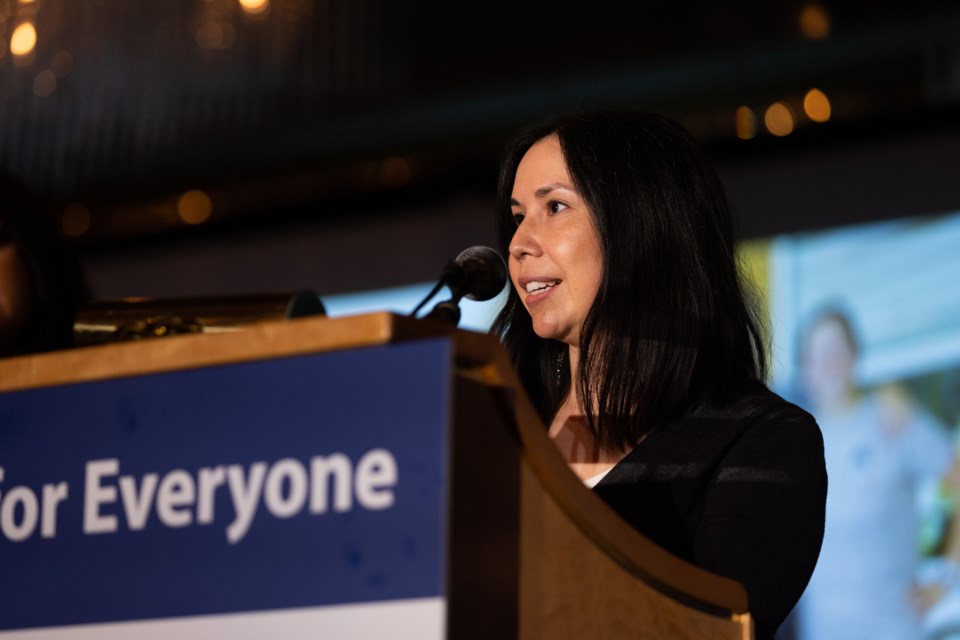The B.C. government has awarded the Breaking Barriers award.
was bestowed on March 21, International Day for the Elimination of Racial Discrimination, at the annual Multiculturalism and Anti-Racism Awards ceremony held at the Pan Pacific in Vancouver.
Over 100 people and organizations were nominated for awards this year; five award recipients were honoured in three categories, and six were recognized with honourable mentions.
This was the first in-person award since 2019 due to the pandemic.
About the award
The Breaking Barriers award recognizes outstanding work in tackling systemic or institutional racism, and reducing barriers for marginalized communities, according to a news release.
"Indigenous Women Outdoors are just such champions, and it's just so inspiring to hear the work that they do. And I think they're just well deserving to be recognized as the winner of this category," told The �鶹�����.
Background of IWO
Indigenous Women Outdoors was explicitly created to address systemic and institutional barriers preventing Indigenous women, and other racialized folks living on Sḵwx̱ú7mesh (Squamish), Líl̓wat (Lil'wat First Nation), səlil̓ilw̓ətaʔɬ (Tsleil-Waututh), and xʷməθkʷəy̓əm (Musqueam) territories from accessing the outdoors for healing or recreation.
The organization was sparked in 2017 when its founder, Squamish’s Myia Antone, of the Sḵwx̱wú7mesh Úxwumixw, attended a MEC summit. She received a grant for a hiking project, which aimed to get more Sḵwx̱wú7mesh women out on the land.
Programs today
"The land is such a healing place for Indigenous folks. That said, there are … so many barriers that have been put up. Removing those barriers and making it accessible for the folks who care and [have] respect for the land ... is such a healing and important opportunity to provide," said Aiyana Anderson-MacIsaac, who is of Scottish and Cree descent and a current board member with IWO.
She was a participant in early programming offered by the organization, she said.
The programs of IWO "strengthen the matriarchal Indigenous leadership and representation in the outdoor industry," said fellow board member Melissa Arnott, who is Anishinaabe from the Ojibwe Nation. "And with support from our allies that we have, we are able to remove some of those barriers, and barriers that are economic for sure. But some of the other ones that are very important are the emotional, and the mental barriers, when you don't see yourself represented out there."
The programs are often at low or no cost for participants and often include the gear needed for the activity.
Arnott added that building confidence through mentorship and sharing knowledge is also key.
Equity is at the core of the organization and programs.
"Everybody is fully invited, showing up wherever you are; however you are. You are accepted. You belong. You are loved," Arnott said, adding that her family was impacted by the Sixties Scoop, so she didn't grow up with her cultural teachings and is learning them day by day.
Currently, the non-profit society offers a backcountry ski and snowboarding program, a snowshoeing program, a trail running mentorship program and a social run group, as well as a mountain biking program.
Coming up, the group plans to start a low-intensity program focused on nature walks, and learning about the plants in the Sea to Sky area and some harvesting and foraging.
Arnott said these will be starting in the summer and fall.
Women even come from Vancouver Island, driving up from D'Arcy down to Squamish.
"Really making that commitment to be involved," said Arnott.
Asked what the group needs, Arnott said they have been "very fortunate" to have a lot of interest from a lot of supporters and companies, which is appreciated, but “it's almost so much that it's been overwhelming because we are volunteer-run," she said.
"It's a good problem to have, but I would say, for sure, … but if you don't hear back from us right away, come with an understanding of knowing that relationships take a long time to build."
Anderson-MacIsaac said beyond the organization, patience and holding space are important.
"I would say just the high level beyond this award is just hold space for Indigenous, Black and racialized communities. Like in a room, like take a step back, listen, allow for space ... and then give the time as well."
Find out more about Indigenous Women Outdoors
Watch the award ceremony below.





